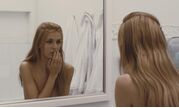At first, both of them were lying and came to the room with precautions. From the costumes (Natasha is clothed and Alba is naked), it can be seen that Alba fell in love first. After the first sex (Alba is the lead) Alba hides herself (with a silk scarf, in the shade, away from Natasha) and tells her story. Later, Max's insertion made Natasha's lie self-defeating. For the second time (Natasha is the lead) she is on the balcony and Alba is in the room, and again she begins to tell her own story. The stories of the two people are both true and false, and the defense can only be broken through "deepening" time and time again. At this point, it doesn't matter what is true or false, this room is no longer just a room.
Natasha said at the very beginning that she loves men, and she still loves men after tonight. Alba has made no secret of her love since the beginning. It seems that Alba loves more and Natasha is more ruthless. In fact, Natasha knew that this night was a good night only if she was soberly controlled. The two of them finally have to walk out of the room, and only in this way will they be more handsome and painful. So Natasha rejected Alba's embrace in the early morning and pulled out that Cupid's sword. Alba finally seems to understand, she uses the bed sheet as the last symbol of the two people in this room (she said that Natasha is very beautiful in white). It was agreed that there would be no memory left, and one night would turn everything upside down.
Whether same-sex or opposite-sex. There will be times when you want to leave, and "Room in Rome" is more like a dialogue between yourself and yourself. Shouldn't our love be a secret? Our love came too soon? What you thought was impossible has become possible in front of love.
The last shot is more like telling tolerance, homosexuality should not be hidden from the light.
View more about Room in Rome reviews










